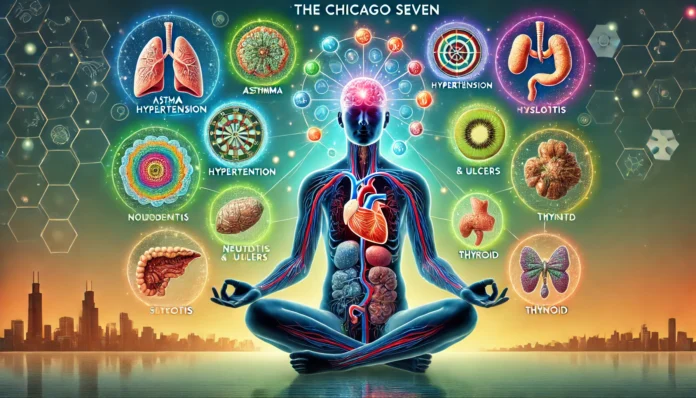The Chicago Seven Aren’t Crime Stories
In traditional medicine, Chicago’s Seven Psychosomatic Disorders are considered incurable. Yet, to the surprise of doctors themselves, these disorders can disappear on their own—a mystery kept secret from you until now. Curious? Let’s dive in!
Ever heard the saying, “Stress can make you sick”? Well, it turns out there’s more truth to that than we might realize! The interplay between the mind and body fascinates me, particularly how emotional and psychological factors manifest in physical health. Imagine your body as a mirror, reflecting not just your physical state, but also your deepest emotions and unspoken conflicts.
Franz Alexander, often referred to as one of the pioneers of psychosomatic medicine, identified seven psychosomatic disorders that he believed were deeply rooted in emotional and psychological conflicts. He collectively termed seven physical illnesses as the “Chicago Seven.” These aren’t crime stories—they’re tales of how our minds can affect our health.
Emotions Are Making You Sick Or Potential for Self-Healing
It’s essential to emphasize that while these disorders are considered resistant to traditional medical interventions, they often carry the potential for self-healing through addressing the underlying emotional issues. These conditions are—bronchial asthma, hypertension, neurodermatitis, colitis, duodenal ulcer, thyrotoxicosis, and rheumatoid arthritis—highlight how emotional stress and personality traits can significantly influence physiological health.
Let’s break it down into plain language and explore what these conditions are and how emotions play a role!
What Are Psychosomatic Disorders?
Psychosomatic disorders are physical ailments exacerbated or caused by psychological factors. They occur when chronic stress or unresolved emotional conflicts disrupt the body’s systems, leading to observable symptoms.
Franz Alexander, proposed that these conditions result from the complex interaction between unconscious emotional conflicts and the autonomic nervous system. You already know from the previous article that “our body never makes mistakes. It is extremely intelligent to the point that it is designed to survive despite all our circumstances or “abuse” that we often put it through, such as starvation, alcohol, nicotine poisoning, caffeine, sleep deprivation, reaction to stress, and other chemical, emotional and physical trials. Your body is designed to survive no matter what.” The “Chicago Seven” emphasized specific emotional stressors tied to each disorder.
The Chicago Seven and Their Emotional Roots
1. Bronchial Asthma: The Breath of Fear
Asthma is often linked to repressed emotions and dependency conflicts. Alexander suggested that individuals with asthma may struggle with a subconscious fear of separation or loss, leading to constriction in breathing as a symbolic defense mechanism. Asthma —it’s often tied to feelings of dependence and fear of being alone. If emotions could talk, asthma might say, “I’m holding on tight because I’m scared to let go.”
Tip: Learning to manage anxiety and practicing breathing techniques can help more than just your lungs.
2. Hypertension: Bottled-Up Pressure
Chronic high blood pressure is frequently associated with suppressed anger and a constant state of tension. Alexander believed that individuals with hypertension often internalize stress, creating a “boiling pot” effect that affects cardiovascular function. High blood pressure is more than salty snacks—it’s about bottled-up emotions, especially anger. Think of it as a pressure cooker: if you never release steam, things can explode.
Tip: Get moving! Exercise or even a hobby like painting can help you blow off steam without boiling over.
3. Neurodermatitis: Skin Deep Stress
This skin condition, characterized by chronic itching and inflammation, is thought to reflect repressed emotional distress, often related to unresolved anger or anxiety. The skin becomes a medium for expressing internal turmoil. Ever notice your skin acting up when you’re stressed? Neurodermatitis, a chronic itch-scratch cycle, often shows up when emotions are repressed. It’s like your skin is yelling, “Help me deal with this stress!”
Tip: Mindfulness and relaxation can keep those flare-ups at bay.
4. Colitis: Gut Reactions
Inflammatory bowel conditions like colitis are linked to anxiety and perfectionistic tendencies. These individuals often have a heightened sensitivity to external pressures, causing their gastrointestinal system to react to emotional stress. Yes, your stomach isn’t just digesting food—it’s digesting your emotions too! Colitis, or chronic gut inflammation, often flares when perfectionists feel overwhelmed. It’s like your digestive system is waving a red flag: “This is too much pressure!”
Tip: Give your gut a break with stress-reducing habits like yoga or journaling.
5. Duodenal Ulcer: Acidic Anxiety
Ulcers, particularly in the duodenum, are tied to prolonged stress and feelings of inadequacy. Alexander noted that individuals with ulcers often exhibit a pattern of overworking to prove their worth, leading to excessive gastric acid secretion. Do you feel like you always have to prove yourself? That constant drive can churn up more than just ambition—it can churn out extra stomach acid, leading to ulcers.
Tip: Slow down, take breaks, and remember: you’re enough just as you are.
6. Thyrotoxicosis: Can’t Stop, Won’t Stop
Hyperthyroidism, or thyrotoxicosis, is often associated with individuals who are always on the go, hyperactive, driven, and anxious. The overproduction of thyroid hormones reflects a state of chronic overstimulation, mirroring an inability to “slow down.” These people’s thyroid is begging: “Can we PLEASE take a break?” It’s the body’s way of saying, “Your overdrive is overdoing it!”
Tip: Try relaxation techniques like deep breathing or meditation to help your body—and mind—chill out.
7. Rheumatoid Arthritis: Stiff Emotions
Alexander viewed this autoimmune disorder as a manifestation of repressed hostility and emotional rigidity. The immune system’s attack on the body symbolizes internalized anger and unexpressed emotional pain. If joints could talk, rheumatoid arthritis might say, “I’m stuck because you’re holding on to too much anger or pain.” It’s a physical reminder that emotional flexibility is just as important as physical flexibility.
Tip: Express your feelings—whether it’s through talking, writing, or even dancing!
The Neuropsychological Perspective
From a neuropsychological standpoint, these conditions highlight the role of the autonomic nervous system, which governs stress responses. Chronic activation of the sympathetic nervous system—our “fight or flight” mechanism—can lead to systemic inflammation, hormonal imbalances, and immune dysfunction. This connection underscores the need for addressing both psychological and physical aspects of health.
Implications for Treatment What Can You Do?
If any of these sound familiar, don’t worry—there’s good news! You can help your mind and body work together with a few simple strategies:
1. Train int out: train your brain with Neurofeedback.
2. Regress it out: Release subconscious traumatic memories with Regression Therapy.
3. Talk it out: Clear “engrams” with Dianetics can help you get to the root of emotional conflicts.
4. Move it out: Exercise reduces stress and boosts happy hormones.
5. Breathe it out: Mindfulness, meditation, and deep breathing calm your nervous system.
Understanding the emotional roots of these disorders offers a roadmap for holistic treatment.
The Most Effective Approaches Include:
1. EEG Neurofeedback: Imagine being able to catch your brain slipping into reactive states in real-time, and shifting back to clear, calm, focused and alert control. Neurofeedback gives you that power, training your brain to stay steady even during challenging moments. With time, you learn to override the “reactive mode” and make room for mature, thoughtful conscious responses.
Neurofeedback, developed by NASA, is a type of EEG biofeedback that helps self-regulate and correct irregular brainwave patterns tied to mental, cognitive and neurological issues. Research has found that conditions like ADHD, anxiety, and PTSD are often linked to abnormal brain waves. Neurofeedback prompts your brain to produce healthy brain waves patterns closer to the scientific range of norm using operant conditioning sound). It is non-invasive, painless and side effects free. Neurofeedback offers specific protocols to train the prefrontal cortex and regulate brainwave patterns.
2. Dianetics: Dianetics, created by L. Ron Hubbard, aimed at mental and emotional healing by addressing subconscious memories of past traumas, called “engrams.” Through a process known as “auditing,” a trained practitioner guides individuals to recall and “re-experience” these memories, with the goal of reducing their negative impact. Using a device called an E-meter to track changes in the individual’s mental state, practitioners help them confront and “clear” these memories, aiming to achieve a state called “Clear” that is free from emotional distress caused by the reactive mind Dianetics helps you uncover and release stored traumatic memories, making way for the prefrontal cortex to take charge. With this shift, you can respond with the calm and clarity of a healthy adult.
3. Regression Therapy: This technique guides you in a semi-conscious state to explore subconscious traumatic memories, often from early life or even pre-birth, to uncover deep-seated subconscious emotional patterns and imprints. Through techniques like guided visualization, regression therapy helps you revisit these memories safely, allowing you to release repressed emotions and gain valuable insights that break old, limiting patterns.
4. Mindfulness and Meditation: These may sound simple, but they’re game-changers. By becoming aware of your thoughts and emotions as they arise, you create space to pause before reacting. Over time, mindfulness strengthens your prefrontal cortex, helping you manage emotions and respond with clarity rather than defaulting to “reactive mode.”
5. Lifestyle Changes: A balanced diet, regular exercise, and proper sleep are critical for maintaining both mental and physical health.
Conclusion
Franz Alexander’s “Chicago Seven” underscores the profound connection between emotional well-being and physical health. As we continue to explore the mind-body interface, it becomes increasingly clear that treating the whole person—mind and body—is essential for optimal health. Recognizing the psychological roots of physical symptoms allows for more effective, compassionate, and comprehensive care.
Your emotions and body are like roommates—they share the same space, so they need to get along! Franz Alexander’s “Chicago Seven” reminds us that listening to our emotions is just as important as taking care of our physical health. So next time your body sends you a signal, don’t ignore it—it might just be trying to tell you how it feels.




